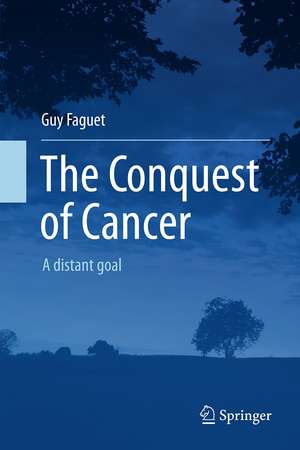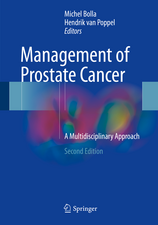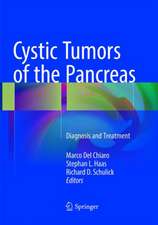The Conquest of Cancer: A distant goal
Autor Guy Fagueten Limba Engleză Hardback – 28 noi 2014
| Toate formatele și edițiile | Preț | Express |
|---|---|---|
| Paperback (1) | 714.27 lei 6-8 săpt. | |
| SPRINGER NETHERLANDS – 23 aug 2016 | 714.27 lei 6-8 săpt. | |
| Hardback (1) | 721.19 lei 6-8 săpt. | |
| SPRINGER NETHERLANDS – 28 noi 2014 | 721.19 lei 6-8 săpt. |
Preț: 721.19 lei
Preț vechi: 759.15 lei
-5% Nou
Puncte Express: 1082
Preț estimativ în valută:
137.100€ • 144.08$ • 114.21£
137.100€ • 144.08$ • 114.21£
Carte tipărită la comandă
Livrare economică 04-18 aprilie
Preluare comenzi: 021 569.72.76
Specificații
ISBN-13: 9789401791649
ISBN-10: 9401791643
Pagini: 249
Ilustrații: XV, 249 p. 26 illus., 7 illus. in color.
Dimensiuni: 155 x 235 x 17 mm
Greutate: 0.55 kg
Ediția:2015
Editura: SPRINGER NETHERLANDS
Colecția Springer
Locul publicării:Dordrecht, Netherlands
ISBN-10: 9401791643
Pagini: 249
Ilustrații: XV, 249 p. 26 illus., 7 illus. in color.
Dimensiuni: 155 x 235 x 17 mm
Greutate: 0.55 kg
Ediția:2015
Editura: SPRINGER NETHERLANDS
Colecția Springer
Locul publicării:Dordrecht, Netherlands
Public țintă
ResearchCuprins
Preface. Part I An Historical overview of the war on cancer. The four-decade journey to the National Cancer Act of 1971. Part II Cancer through the ages.- An historical overview: From prehistory to WW11.- Our current knowledge.- Environmental carcinogens.- Part III Cancer statistics.- Assessing the enormity of the problem.- An uncontrolled problem.- Part IV How is advanced cancer treated?-The cancer-cell kill paradigm and beyond.- Complementary and alternative medicine.- The cell-kill paradigm: Bleak outcomes. Part V Stakeholders' role in the status quo.- The role of the National Cancer Institute.- Factors that impact Oncology research and practice.- The complex physician-patient interaction: Expectations vs. reality. Part VI A paradigm shift in cancer management.- Prevention & Early detection.- The holistic management of advanced cancer: A three-stage blueprint. Conclusions. References. Index.
Recenzii
"Dr. Guy B. Faguet's The Conquest of Cancer: A distant Goal takes the reader on a fascinating journey of decades of cancer research. In a meticulous manner, Dr. Faguet resumes his story from where he left us with his previous work The War on Cancer: An anatomy of failure; A blueprint for the future, just a decade ago. He goes into some very pertinent details about the current hot topic in cancer research; i.e., the genetic basis of various types of cancer and current understanding of cancer spreads. A large section of the book is devoted of why there has been a rather unfortunate stagnation or what Faguet calls " status quo", and what role does National Cancer Institute play despite its leader's well-meaning enthusiasm. The author deserves our gratitude for a forthright, very necessary, and very timely discussion on end of life care and management of advanced stage cancer. To this reader, the section on the history of how President Nixon came to embrace the fight against cancer, devoting a significant part of his January 22, 1971 State of the Union address and how he successfully maneuvered to have Senator Edward Kennedy withdraw his name as sponsor of the bill (National Cancer Act), which Mr. Nixon signed as a Christmas gift to the nation on December 23, 1971 not only is very interesting, but it also informs us how intimately does politics play a part in cancer research. Dr. Faguet writes in a highly readable style, accessible both to the lay public as well as cancer researchers. His authoritative and unbiased account of the present status of the war against cancer - not a pretty picture, provides hope for success in the immediate future because of breakthrough progress in molecular genetics of cancer."
Kanti Rai, M.D.
Joel Finkelstein Cancer Foundation Professor of Medicine
Professor of Medicine
Hofstra North Shore-LIJ School of Medicine
New York, NY
Kanti Rai, M.D.
Joel Finkelstein Cancer Foundation Professor of Medicine
Professor of Medicine
Hofstra North Shore-LIJ School of Medicine
New York, NY
Notă biografică
Dr. Faguet retired from the Medical College of Georgia (now Georgia Regents University) after a 30-year academic career that included clinical and bench research funded by the National Institutes of Health and the Department of Veterans Affairs, respectively. He was a member of numerous scientific societies, a consultant for the National Institutes of Health, the Department of Veterans Affairs, the National Science Foundation and the American Cancer Society and a reviewer for several prestigious scientific journals. He authored numerous peer-reviewed publications and seven book chapters and edited two books: Hematologic Malignancies (The Humana Press, 2000) & Chronic Lymphocytic Leukemia (The Humana Press, 2003). Since retiring, Dr. Faguet has authored three books on Public and Health Policy: The War on Cancer (Springer, 2005), Pain Control and Drug Policy (Praeger, 2010) and The Affordable Care Act (Algora, 2013). For more biographical data please visit: www.faguet.net
Textul de pe ultima copertă
Based on 30 years of clinical and research experience, backed by a careful assessment of four decades of published data, Dr. Faguet documented in The War on Cancer (Springer 2005), early advances in cancer treatment and patient survival that soon stalled. Ten years later, and after an exhaustive analysis of evidence-based data available through 2013 that incorporates 755 references, he reveals the root causes of the stagnation in cancer control, including the role played by major stakeholders, and advocates a coordinated national effort, akin to the Apollo program, to unveil the causes of cancer and their mastery. In the interim, Dr. Faguet urges caregivers to manage patients according to the four ethical principles of beneficence, non-maleficence, respect for patients’ autonomy, and justice especially at the end of life.
Caracteristici
Author published 5 previous books on cancer and health policy Content is based on the author's 30 years of clinical and research cancer experience complemented by an exhaustive review of available data published through 2013 Includes a review of the history of cancer through the ages and of the evolution of cancer drugs from mustard gas leading to cytotoxic drugs through the new targeted therapeutics exposing their ineffectiveness Describes stakeholders role in the status quo and proposes an Apollo program-like coordinated national effort to break the impasse Includes supplementary material: sn.pub/extras






















